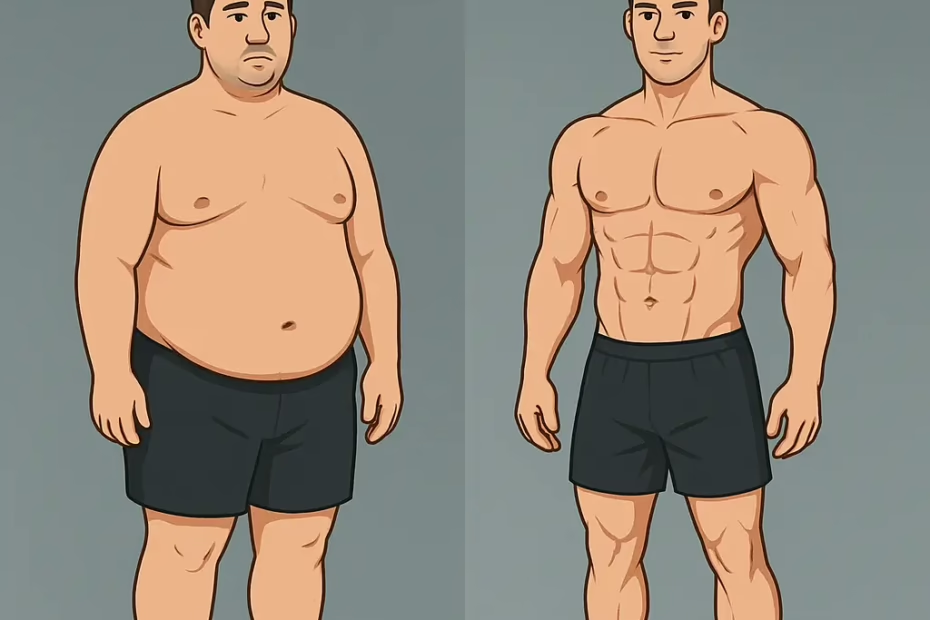TL;DR: Fat loss and weight loss are not the same. In fact, if you’re only chasing the number on the scale, then you’re likely missing the real goal. Instead, focus on losing fat while maintaining muscle for better results and long-term health. This guide breaks down what fat loss truly means, why it matters, and how to do it sustainably.
🎯 Unlock Your Full Potential with SaedCoach’s Free AI Tools!
No matter your fitness level, these smart, easy-to-use tools are designed to help you take full control of your progress—nutrition, training, and tracking all in one place.
🔗 Take the Next Step Toward Your Goals:
- 📊 Body Mass Index (BMI) Calculator – Quickly assess your health based on weight and height.
- 🔥 Daily Calorie Calculator – Discover how many calories you need to cut fat or gain lean muscle.
- 🏋️♂️ One Rep Max (1RM) Calculator – Know your strength levels and adjust your workouts accordingly.
- 🍽️ AI Meal Planner – Generate custom meal plans that match your fitness goals and preferences.
- 📈 AI Progress Tracker – Monitor your body transformation and stay on track.
- 🧪 AI Supplements Recommender – Get science-based supplement suggestions tailored to your body and goals.
- 🏋️ Workout Generator – Create a full training plan in seconds—perfect for beginners or pros.
- 🧠 Fitness & Nutrition Knowledge Tools – Learn what your body really needs and make informed decisions.
🧩 What Is Fat Loss (And How Is It Different from Weight Loss)?
Let’s set the record straight: fat loss refers to reducing stored body fat—not just dropping scale numbers.
In contrast, weight loss includes loss of water, muscle, and fat. The problem? Losing muscle slows your metabolism and hurts long-term progress.
According to Obesity Reviews and The American Journal of Clinical Nutrition, body fat percentage is a far more accurate indicator of health and fitness than body weight alone.
💥 Why Fat Loss Should Be Your True Goal
Here’s why targeting fat (not just weight) changes everything:
✅ Better Insulin Sensitivity
Losing visceral fat improves how your body processes carbs, helping to prevent insulin resistance and type 2 diabetes.
✅ Boosts Metabolic Flexibility
A leaner body switches more efficiently between carbs and fat for fuel—keeping your energy steady throughout the day.
✅ Improves Athletic Performance
More muscle, less fat = more strength, better endurance, and greater functional capacity.
✅ Reduces Risk of Heart Disease
Lower body fat, especially around the waist, leads to healthier cholesterol and lower inflammation.
Pro Insight: People who lose fat and preserve muscle are more likely to maintain results and feel good doing it.
⚙️ How Does Fat Loss Actually Work?
Fat loss happens when your body burns stored triglycerides for energy. To do this effectively, you need:
- A consistent calorie deficit (15–25% below maintenance)
- Exercise stimulus (especially resistance training)
- Hormonal balance (including insulin and cortisol regulation)
🧬 Through a process called lipolysis, fat breaks down into fatty acids and glycerol, which are used as fuel.
🔍 Related Post: How to Calculate Your Daily Caloric Needs
📋 Fat Loss Framework: What Works (Backed by Science)
Here’s your step-by-step roadmap to lose fat without losing muscle:
1. 🔍 Track Your Calories
Use apps like MyFitnessPal or Cronometer.
- Aim for a moderate deficit of 15–25%
- Avoid crash dieting—muscle loss is real!
2. 🍗 Prioritize Protein
Consume 1.6–2.2g protein/kg bodyweight daily.
🥩 Best sources:
- Chicken breast
- Eggs
- Whey protein
- Tofu & legumes
- Greek yogurt
Protein supports muscle retention, improves satiety, and burns more calories during digestion (thermic effect).
3. 🏋️ Lift Weights 3–5x Per Week
Strength training is essential to:
- Maintain metabolism
- Sculpt muscle
- Increase strength
- Boost post-exercise fat burn (EPOC effect)
Focus on compound lifts like squats, deadlifts, bench press, and rows.
💡 Related Post: Top 5 Compound Exercises for Fat Loss
4. 🚶♂️ Move More Daily (NEAT)
NEAT = Non-Exercise Activity Thermogenesis
This includes walking, standing, cleaning, fidgeting—all movement that burns calories.
📈 Goal: 8,000–10,000 steps per day.
5. 😴 Get 7–9 Hours of Sleep
Lack of sleep = hormonal chaos:
- Increases ghrelin (hunger hormone)
- Decreases leptin (satiety hormone)
- Raises cortisol (fat-storing hormone)
- Wrecks recovery
💤 Related Post: Muscle Growth: What You Should Know
6. 🔬 Use Supplements Wisely
Helpful Supplements:
- Whey protein
- Green tea extract (EGCG)
- Fiber (psyllium husk)
- Caffeine
Skip These:
- Raspberry ketones
- “Fat burners” with proprietary blends
- Extreme thermogenics
Supplements should support, not replace your plan.
❌ Common Mistakes That Sabotage Fat Loss
- 📉 Obsessing over scale weight
- 🔥 Starving yourself
- 🧍♂️ Skipping strength training
- 😫 Being inconsistent
- 🍗 Neglecting protein intake
✅ Fat Loss is a Lifestyle, Not a Shortcut
There’s no magic pill. Sustainable fat loss requires:
- Consistent nutrition
- Smart training
- Quality sleep
- Long-term thinking
Avoid fad diets and social media “experts.” Stick with evidence-based strategies that build muscle, boost metabolism, and create lasting change.
📌 Summary
| Key Point | Why It Matters |
|---|---|
| Fat loss ≠ weight loss | Fat loss preserves muscle & improves health |
| Prioritize protein | Muscle-sparing and hunger-reducing |
| Lift weights | Prevents metabolic slowdown |
| Move more | Boosts daily calorie burn |
| Sleep well | Optimizes hormones & recovery |
| Avoid gimmicks | Science > supplements or fads |
🔥 Ready to Transform?
If you’re serious about reshaping your body, it’s time to ditch the scale obsession and focus on what truly matters: fat loss done right.
Need help designing your plan? Check out our Free Fat Loss Blueprint for Beginners, or book a consultation with one of our certified coaches.
💬 Let us know in the comments: What’s your biggest struggle with fat loss right now?

Pingback: Home Fitnessfor Intermediates: The Best Guide + Free Plans - health & fitness
Comments are closed.